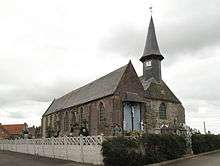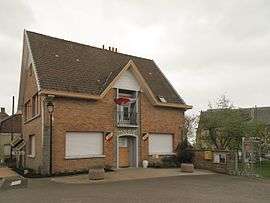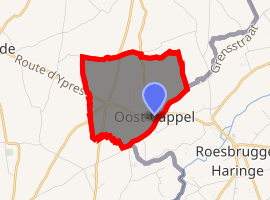Oost-Cappel
Oost-Cappel is a commune in the Nord department in northern France on the Belgian border.

Oost-Cappel, church: l'église Saint Nicolas
Oost-Cappel | |
|---|---|
 Oost Cappel, townhall | |
_Nord-France.svg.png) Coat of arms | |
Location of Oost-Cappel 
| |
 Oost-Cappel  Oost-Cappel | |
| Coordinates: 50°55′31″N 2°35′54″E | |
| Country | France |
| Region | Hauts-de-France |
| Department | Nord |
| Arrondissement | Dunkerque |
| Canton | Wormhout |
| Intercommunality | Communauté de communes des Hauts de Flandre |
| Government | |
| • Mayor (2014-2020) | Régine Cadart-Devos |
| Area 1 | 3.99 km2 (1.54 sq mi) |
| Population (2017-01-01)[1] | 465 |
| • Density | 120/km2 (300/sq mi) |
| Demonym(s) | Oostcapellois (es) |
| Time zone | UTC+01:00 (CET) |
| • Summer (DST) | UTC+02:00 (CEST) |
| INSEE/Postal code | 59448 /59122 |
| Elevation | 8–17 m (26–56 ft) (avg. 18 m or 59 ft) |
| 1 French Land Register data, which excludes lakes, ponds, glaciers > 1 km2 (0.386 sq mi or 247 acres) and river estuaries. | |
Politics
Presidential Elections 2nd Round
| Election | Candidate | Party | % | |
|---|---|---|---|---|
| 2017 | Marine Le Pen | FN | 54.66 | |
| 2012 | Nicolas Sarkozy | UMP | 50.18 | |
| 2007 | Nicolas Sarkozy | UMP | 50.68 | |
| 2002 | Jacques Chirac | RPR | 73.82 | |
Heraldry
_Nord-France.svg.png) Arms of Oost-Cappel |
The arms of Oost-Cappel are blazoned : Quarterly 1&4: Quarterly Or and sable; 2&3: Bendy argent and azure, a bordure gules; overall an inescutcheon gules, 3 bends vair and a chief Or. |
gollark: negative_utilitarianism_irl
gollark: Monke die of otherwise preventable diseases when young.
gollark: We need it to scale to keep technology existing.
gollark: Yes, or based on how hard it was or something.
gollark: Anarchoprimitivism is not to occur. Arachnoprimitivism MAYBE.
See also
This article is issued from Wikipedia. The text is licensed under Creative Commons - Attribution - Sharealike. Additional terms may apply for the media files.